Latvijas Banka's conference "Sustainable Economy in Times of Change"
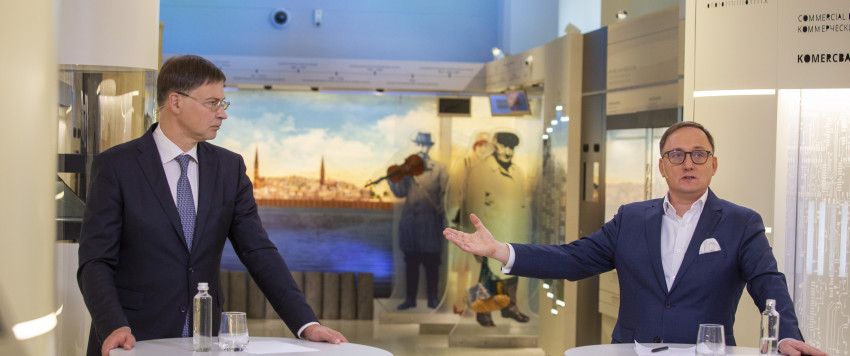
Latvijas Bankas konference, 20.09.2021
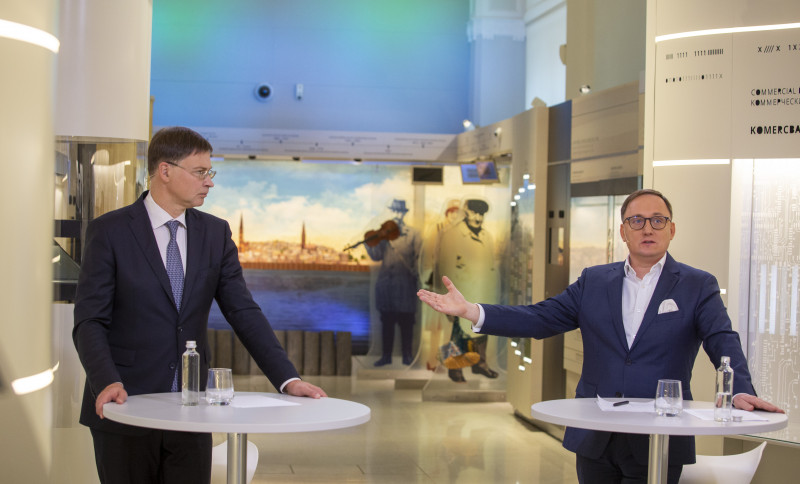
Latvijas Bankas konference, 20.09.2021

Latvijas Bankas konference, 20.09.2021

Latvijas Bankas konference, 20.09.2021
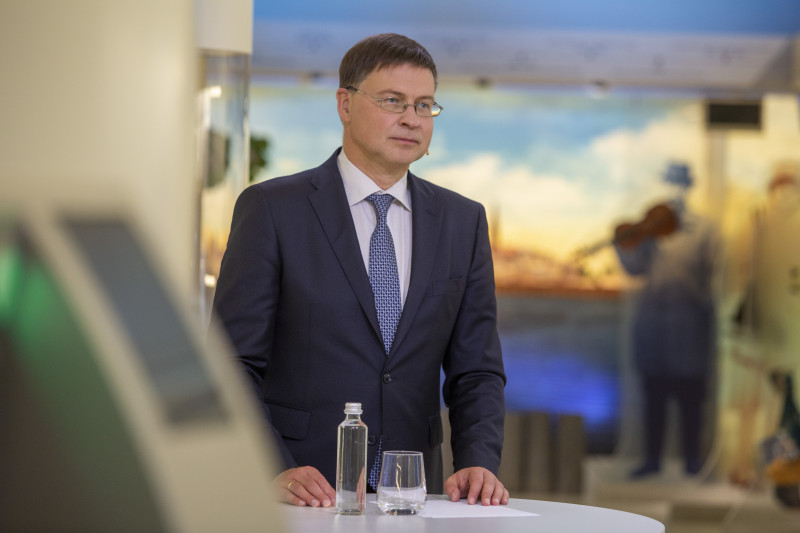
Latvijas Bankas konference, 20.09.2021

Latvijas Bankas konference, 20.09.2021
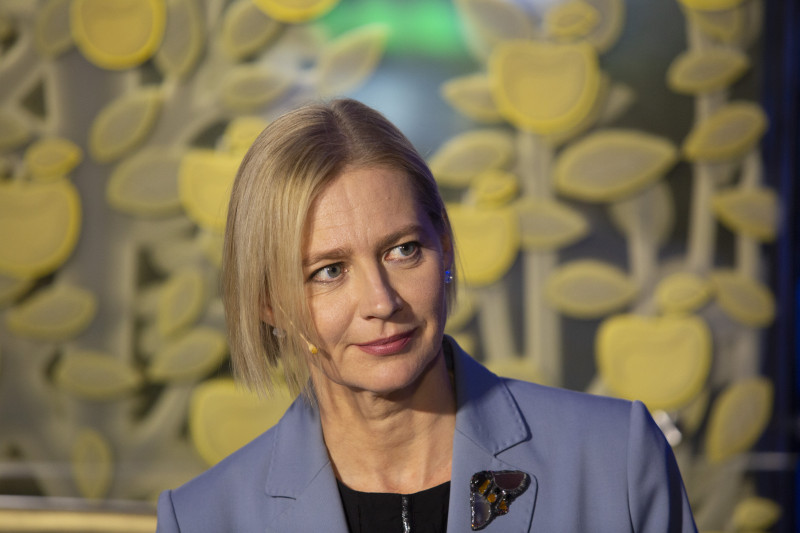
Latvijas Bankas konference, 20.09.2021

Latvijas Bankas konference, 20.09.2021
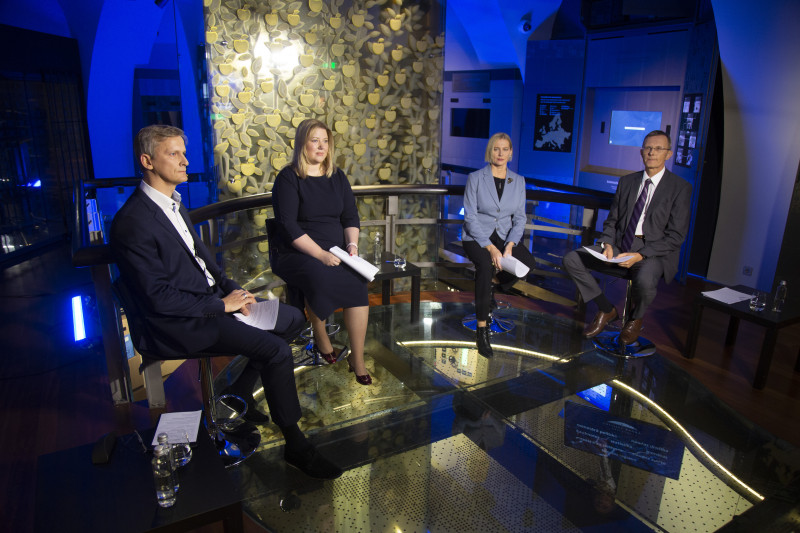
Latvijas Bankas konference, 20.09.2021

Latvijas Bankas konference, 20.09.2021
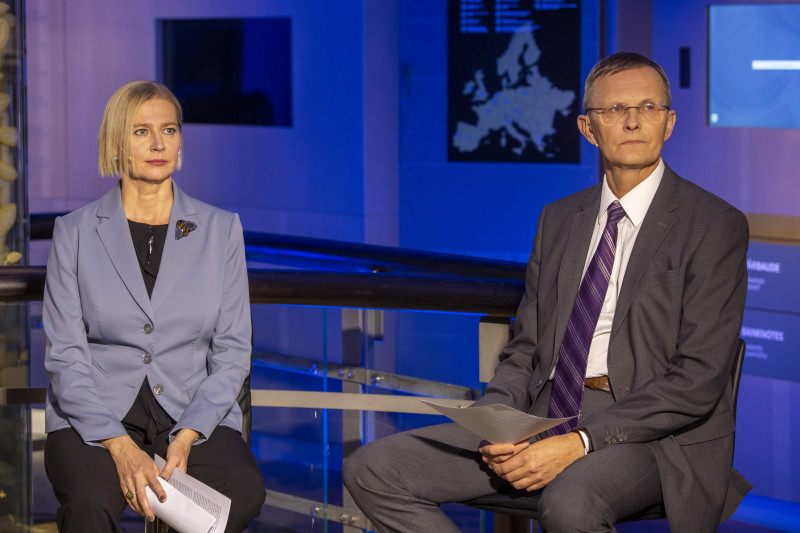
Latvijas Bankas konference, 20.09.2021
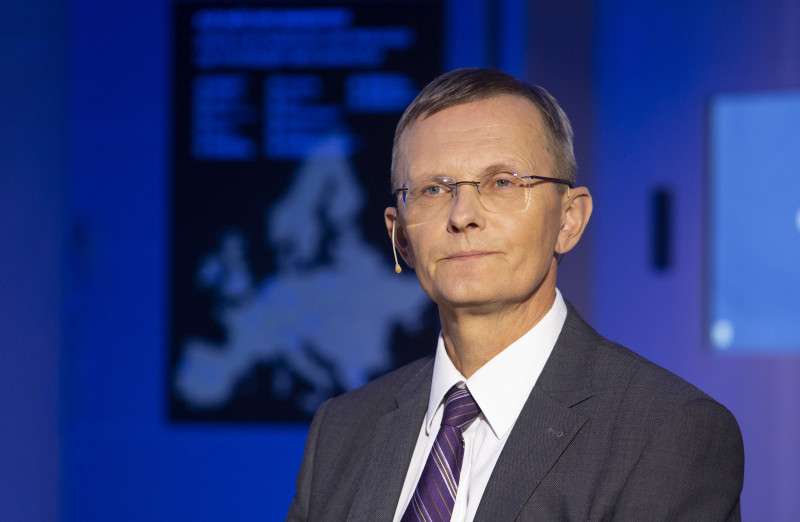
Latvijas Banka hosted its annual economic conference on 20 September 2021 (from 12.30 p.m. CEST). This year, it was dedicated to the subject of a sustainable economy. The conference comprised two panel discussions: "Monetary and fiscal policy – interplay or fight?" and "Moving towards sustainable development".
The keynote speech to the conference participants and the audience was delivered by Isabel Schnabel, Member of the Executive Board of the European Central Bank (ECB).
The speech was followed by panel discussion I "Monetary and fiscal policy – interplay or fight?", focussing on the following topics:
- Interaction between monetary and fiscal policies, the role of public investment and debt sustainability in an environment of low interest rates, negative interest rate and growth differentials;
- Potential risks of rising debt levels in the post-pandemic era, globally and in the euro area; monetary policy options given such fiscal policies; the consequences of the historically low interest environment for the interaction of monetary and fiscal policies; the implications of the low interest rate environment for the possible changes in the EU fiscal architecture;
- The ECB's new monetary policy strategy.
This panel discussion was moderated by Reuters International News Agency journalist John O'Donnell, and the panellists were Isabel Schnabel, Mārtiņš Kazāks, Governor of Latvijas Banka and Member of the Governing Council of the ECB, Valdis Dombrovskis, Executive Vice President of the European Commission, Claudio Borio, Head of the Monetary and Economic Department of the Bank for International Settlements, Jordi Gali, CREI Senior Researcher, UPF Professor and Barcelona GSE Research Professor.
Panel discussion II "Moving towards sustainable development" was dedicated to the following topics:
- Interest and mandate of central banks to deal with sustainability issues;
- The European Green Deal of the European Commission, its priorities, scope, overall objective and instruments;
- Current sustainability issues and challenges; internal possibilities and resources;
- Significance of the financial sector in the process of moving towards the green transformation.
The discussion was moderated by Edvards Kušners, Head of Sustainability at Latvijas Banka, and the panellists were Zane Petre, Head of the European Commission Representation Office in Latvia, Krista Baumane, Member of the Latvian Parliament, Andris Vilks, Member of the Council of Latvijas Banka and Kristīne Černaja-Mežmale, Member of the Council of the Latvian Financial and Capital Market Commission.
-
Programme
Programme
13.30–13.35 (Latvian time or 12.30–12.35 for Germany, Belgium, Switzerland and Spain)
CONFERENCE OPENING
Master of Ceremonies Mr Ivars Svilāns, Head of Communication Department, Latvijas Banka13.35–13.50 (12.35–12.50)
KEYNOTE SPEECH
Ms Isabel Schnabel, Member of the Executive Board of the European Central Bank13.50–15.20 (12.50–14.20)
PANEL DISCUSSION I (moderated discussion without any introductory presentation)
Monetary and fiscal policy – interplay or fight?- interaction between monetary and fiscal policies, the role of public investment and debt sustainability in an environment of low interest rates, negative interest rate and growth differentials;
- potential risks of rising public debt levels in the post-Covid era, globally and in the euro area in particular; the consequences of the historically low interest environment for the interaction of monetary and fiscal policies (including the potential for fiscal dominance); the implications of the low interest rate environment for the possible changes in the EU fiscal architecture (including, among others, changes to S&G pact);
- ECB strategy review.
Moderator: Mr John O'Donnell, journalist, Reuters
Panellists:
Ms Isabel Schnabel, Member of the Executive Board of the European Central Bank
Mr Mārtiņš Kazāks, Governor, Latvijas Banka
Mr Valdis Dombrovskis, Executive Vice President, European Commission
Mr Claudio Borio, Head of Monetary and Economic Department, BIS
Mr Jordi Gali, CREI Senior Researcher, UPF Professor and Barcelona GSE Research Professor15.20–15.35 (14.20–14.35)
BREAK15.35–17.00 (14.35–16.00)
PANEL DISCUSSION II
Moving towards sustainable development- interest and mandate of central banks to deal with sustainability issues in the light of the ECB strategy review, changes in economic thinking;
- he European Green Deal of the European Commission, its priorities, scope, overall objective and instruments;
- current sustainability issues and challenges for Latvia; circular economy vs linear economy; internal resources and possibilities; role of productivity;
- significance of the financial sector in the process of moving towards the green transformation.
Moderator: Mr Edvards Kušners, Adviser to the Council of Latvijas Banka
Panellists:
Ms Zane Petre, Head of European Commission Representation Office in Latvia
Ms Krista Baumane, Member of the Latvian Parliament
Mr Andris Vilks, Member of the Council of Latvijas Banka
Ms Kristīne Černaja-Mežmale, Member of the Council of the Latvian Financial and Capital Market CommissionCONCLUDING REMARKS
-
Speakers and moderators
KEYNOTE SPEECH
 Isabel Schnabel is a Member of the ECB's Executive Board, where she is responsible for market operations, research and statistics, and Professor of Financial Economics at the University of Bonn (on leave). Before joining the ECB, she was a spokesperson of the Cluster of Excellence "ECONtribute: Markets & Public Policy". From 2014 to 2019, she served as a Member of the German Council of Economic Experts ("Sachverständigenrat zur Begutachtung der gesamtwirtschaftlichen Entwicklung"), and in 2019 she was Co-Chair of the Franco-German Council of Economic Experts. In 2018, she was awarded the Gustav Stolper Prize of the Verein for Socialpolitik. She is currently a Council Member of the European Economic Association.
Isabel Schnabel is a Member of the ECB's Executive Board, where she is responsible for market operations, research and statistics, and Professor of Financial Economics at the University of Bonn (on leave). Before joining the ECB, she was a spokesperson of the Cluster of Excellence "ECONtribute: Markets & Public Policy". From 2014 to 2019, she served as a Member of the German Council of Economic Experts ("Sachverständigenrat zur Begutachtung der gesamtwirtschaftlichen Entwicklung"), and in 2019 she was Co-Chair of the Franco-German Council of Economic Experts. In 2018, she was awarded the Gustav Stolper Prize of the Verein for Socialpolitik. She is currently a Council Member of the European Economic Association.
Isabel Schnabel studied Economics at Université Paris 1 Panthéon-Sorbonne, the University of California, Berkeley and the University of Mannheim, where she also received her PhD in 2003.PANEL DISCUSSION I. MONETARY AND FISCAL POLICY – INTERPLAY OR FIGHT?
 Moderator John O'Donnell is Chief Correspondent with Reuters. He reports about economic, political and financial affairs from across the continent, from the euro area debt crisis and Brexit to the financial scandals of European money laundering and Wirecard. Having earlier worked with The Sunday Times in London, John O'Donnell has travelled the continent with Reuters from Riga to Brussels, Berlin to Zurich to cover the region's top economic and political events.
Moderator John O'Donnell is Chief Correspondent with Reuters. He reports about economic, political and financial affairs from across the continent, from the euro area debt crisis and Brexit to the financial scandals of European money laundering and Wirecard. Having earlier worked with The Sunday Times in London, John O'Donnell has travelled the continent with Reuters from Riga to Brussels, Berlin to Zurich to cover the region's top economic and political events.PANELLISTS
 Mārtiņš Kazāks is Governor of Latvijas Banka as of December 2019. Before that, from August 2018, he was a Member of the Council of Latvijas Banka. In his capacity as Governor of Latvijas Banka, he is a Member of the Governing Council of the European Central Bank (ECB) and the General Council of the ECB. Mārtiņš Kazāks is the Governor of the International Monetary Fund (IMF) for the Republic of Latvia. From 2014 to 2018, he was a Member of the Fiscal Discipline Council of the Republic of Latvia. From 2006 to 2011, he was a Member of the Strategic Analysis Committee of the President of the Republic of Latvia. Since 2005, Mārtiņš Kazāks was Chief Economist of Swedbank AS in Latvia, and since 2010, also Deputy Chief Economist of the Swedbank Group. Mārtiņš Kazāks has lectured at the Stockholm School of Economics in Riga (1996–2008), the University of London, Riga Stradiņš University and Riga Business School. Mārtiņš Kazāks holds a PhD in economics and a MSc in Economics (with distinction) from the University of London, a Diploma in Economics from the University of Cambridge and a BSc in Economics from the University of Latvia.
Mārtiņš Kazāks is Governor of Latvijas Banka as of December 2019. Before that, from August 2018, he was a Member of the Council of Latvijas Banka. In his capacity as Governor of Latvijas Banka, he is a Member of the Governing Council of the European Central Bank (ECB) and the General Council of the ECB. Mārtiņš Kazāks is the Governor of the International Monetary Fund (IMF) for the Republic of Latvia. From 2014 to 2018, he was a Member of the Fiscal Discipline Council of the Republic of Latvia. From 2006 to 2011, he was a Member of the Strategic Analysis Committee of the President of the Republic of Latvia. Since 2005, Mārtiņš Kazāks was Chief Economist of Swedbank AS in Latvia, and since 2010, also Deputy Chief Economist of the Swedbank Group. Mārtiņš Kazāks has lectured at the Stockholm School of Economics in Riga (1996–2008), the University of London, Riga Stradiņš University and Riga Business School. Mārtiņš Kazāks holds a PhD in economics and a MSc in Economics (with distinction) from the University of London, a Diploma in Economics from the University of Cambridge and a BSc in Economics from the University of Latvia.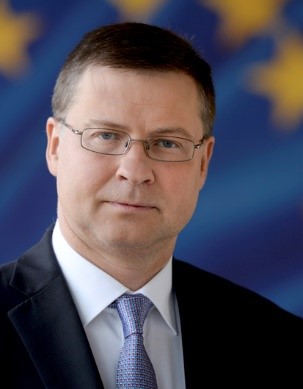 Valdis Dombrovskis is Executive Vice-President of the European Commission responsible for an Economy that Works for People, also in charge of Trade (since October 2020). Before this, he was Vice-President responsible for the euro, social dialogue, financial services and the Capital Markets Union. In Latvia, he was his country's longest-serving head of government with three terms as Prime Minister. He served as Finance Minister, was a Member of the Latvian Parliament and elected twice to the European Parliament. In his pre-political life, he worked as Chief Economist at Latvijas Banka and before that, as a Research Assistant at Mainz University, at the Institute of Solid-State Physics in Latvia and the University of Maryland. Valdis Dombrovskis and holds Master's degrees in both Physics and Economics.
Valdis Dombrovskis is Executive Vice-President of the European Commission responsible for an Economy that Works for People, also in charge of Trade (since October 2020). Before this, he was Vice-President responsible for the euro, social dialogue, financial services and the Capital Markets Union. In Latvia, he was his country's longest-serving head of government with three terms as Prime Minister. He served as Finance Minister, was a Member of the Latvian Parliament and elected twice to the European Parliament. In his pre-political life, he worked as Chief Economist at Latvijas Banka and before that, as a Research Assistant at Mainz University, at the Institute of Solid-State Physics in Latvia and the University of Maryland. Valdis Dombrovskis and holds Master's degrees in both Physics and Economics. Claudio Borio is the Head of the Monetary and Economic Department of the Bank for International Settlements (BIS) since 2013. At the BIS, he has held various positions in the Monetary and Economic Department (MED), including Deputy Head of MED and Director of Research and Statistics as well as Head of Secretariat for the Committee on the Global Financial System and the Gold and Foreign Exchange Committee (now the Markets Committee). From 1985 to 1987, he was an Economist at the OECD, working in the country studies branch of the Economics and Statistics Department. Prior to that, he was Lecturer and Research Fellow at Brasenose College, Oxford University. He holds a DPhil and an MPhil in Economics and a BA in Politics, Philosophy and Economics from the same university. Claudio Borio has authored numerous publications in the fields of monetary policy, banking, finance and issues related to financial stability.
Claudio Borio is the Head of the Monetary and Economic Department of the Bank for International Settlements (BIS) since 2013. At the BIS, he has held various positions in the Monetary and Economic Department (MED), including Deputy Head of MED and Director of Research and Statistics as well as Head of Secretariat for the Committee on the Global Financial System and the Gold and Foreign Exchange Committee (now the Markets Committee). From 1985 to 1987, he was an Economist at the OECD, working in the country studies branch of the Economics and Statistics Department. Prior to that, he was Lecturer and Research Fellow at Brasenose College, Oxford University. He holds a DPhil and an MPhil in Economics and a BA in Politics, Philosophy and Economics from the same university. Claudio Borio has authored numerous publications in the fields of monetary policy, banking, finance and issues related to financial stability. Jordi Galí is a Senior Researcher at the Centre for Research in International Economics (CREI), a Professor at Universitat Pompeu Fabra and a Research Professor at the Barcelona Graduate School of Economics. He was Director of the CREI between 2001 and 2017. He has held academic positions at New York University and Columbia University and has been a Visiting Professor at the Massachusetts Institute of Technology. He is a Research Fellow at the Centre for Economic Policy Research (CEPR), a Research Associate at the National Bureau of Economic Research and a Fellow of the Econometric Society. Jordi Galí has served as Co-editor of the Journal of the European Economic Association and Co‑director of the CEPR International Macroeconomics Programme. In 2012, he served as President of the European Economic Association. Among other awards, Galí has received the National Research Prize from the Government of Catalonia and was a co-recipient of the Yrjö Jahnsson Award. He has been a consultant to the ECB, Federal Reserve, Sveriges Riksbank, Norges Bank, Banque de France and other central banks. His research interests include macroeconomics and monetary theory, and he has published articles on these topics in numerous scientific journals. Jordi Galí earned his PhD in Economics at the Massachusetts Institute of Technology.
Jordi Galí is a Senior Researcher at the Centre for Research in International Economics (CREI), a Professor at Universitat Pompeu Fabra and a Research Professor at the Barcelona Graduate School of Economics. He was Director of the CREI between 2001 and 2017. He has held academic positions at New York University and Columbia University and has been a Visiting Professor at the Massachusetts Institute of Technology. He is a Research Fellow at the Centre for Economic Policy Research (CEPR), a Research Associate at the National Bureau of Economic Research and a Fellow of the Econometric Society. Jordi Galí has served as Co-editor of the Journal of the European Economic Association and Co‑director of the CEPR International Macroeconomics Programme. In 2012, he served as President of the European Economic Association. Among other awards, Galí has received the National Research Prize from the Government of Catalonia and was a co-recipient of the Yrjö Jahnsson Award. He has been a consultant to the ECB, Federal Reserve, Sveriges Riksbank, Norges Bank, Banque de France and other central banks. His research interests include macroeconomics and monetary theory, and he has published articles on these topics in numerous scientific journals. Jordi Galí earned his PhD in Economics at the Massachusetts Institute of Technology.PANEL DISCUSSION II. MOVING TOWARDS SUSTAINABLE DEVELOPMENT
 Moderator Edvards Kušners is Adviser to the Council and Head of Sustainability of Latvijas Banka. He is a former member of the Council of Latvjas Banka (2012–2018). Edvards Kušners started his career at Latvijas Banka in 2003 as the Deputy Head of the Legal Department. From 2005 to 2012, he was also Advisor to the Governor of Latvijas Banka. Before that he was the Director of the European Integration Office. From 2009 to 2012 Edvards Kušners was an external Adviser to the Prime Minister of the Republic of Latvia in public administration matters. From 2008 to 2011, he was a member of the Strategic Analysis Commission of the President of the Republic of Latvia. Edvards Kušners holds a Bachelor's degree in Biology from the University of Latvia, a professional qualification in international economic relations from the Institute of International Relations of the University of Latvia, as well as a Bachelor's degree in Law and a lawyer's qualification from the University of Latvia.
Moderator Edvards Kušners is Adviser to the Council and Head of Sustainability of Latvijas Banka. He is a former member of the Council of Latvjas Banka (2012–2018). Edvards Kušners started his career at Latvijas Banka in 2003 as the Deputy Head of the Legal Department. From 2005 to 2012, he was also Advisor to the Governor of Latvijas Banka. Before that he was the Director of the European Integration Office. From 2009 to 2012 Edvards Kušners was an external Adviser to the Prime Minister of the Republic of Latvia in public administration matters. From 2008 to 2011, he was a member of the Strategic Analysis Commission of the President of the Republic of Latvia. Edvards Kušners holds a Bachelor's degree in Biology from the University of Latvia, a professional qualification in international economic relations from the Institute of International Relations of the University of Latvia, as well as a Bachelor's degree in Law and a lawyer's qualification from the University of Latvia.PANELLISTS
 Zane Petre started working at the Latvian Ministry of Foreign Affairs in 1997, and since then she held various positions at the MFA and representations, including Head of the International Operations and Crisis Management Division, European Correspondent at the Political Director's Office, as well as worked for the Permanent Representation of Latvia to the European Union in Brussels as a representative at the Committee for Civilian Aspects of Crisis Management and the Chief Registry Officer in Moldova. In 2012, she joined the European External Action Service and was Head of the Political, Press and Information Unit at the EU Delegation in Eritrea (2012–2016) and then Deputy Head of Delegation and Head of the Political, Press and Information Team at the EU Delegation to Nepal (2016–2020). In September 2020, she joined the Support Group for Ukraine at the Directorate-General for the European Neighbourhood Policy and Enlargement Negotiations. Since 16 April 2021, Zane Petre is the Head of the European Commission Representation in Latvia.
Zane Petre started working at the Latvian Ministry of Foreign Affairs in 1997, and since then she held various positions at the MFA and representations, including Head of the International Operations and Crisis Management Division, European Correspondent at the Political Director's Office, as well as worked for the Permanent Representation of Latvia to the European Union in Brussels as a representative at the Committee for Civilian Aspects of Crisis Management and the Chief Registry Officer in Moldova. In 2012, she joined the European External Action Service and was Head of the Political, Press and Information Unit at the EU Delegation in Eritrea (2012–2016) and then Deputy Head of Delegation and Head of the Political, Press and Information Team at the EU Delegation to Nepal (2016–2020). In September 2020, she joined the Support Group for Ukraine at the Directorate-General for the European Neighbourhood Policy and Enlargement Negotiations. Since 16 April 2021, Zane Petre is the Head of the European Commission Representation in Latvia.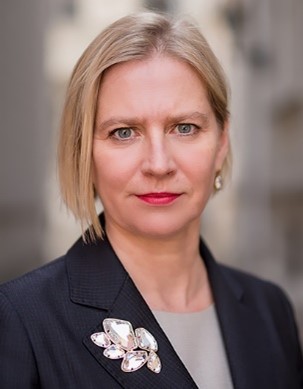 Krista Baumane is a Member of Parliament (13th Saeima, Movement FOR!, "Development/For!" parliamentary group). At the Saeima, Krista sits on the Foreign Affairs Committee, Citizenship, Migration and Social Cohesion Committee, and Environmental and Climate Subcommittee. Prior to accepting her MP mandate, she worked as a marketing manager at the GrassLIFE, the project for restoring grasslands, at the Latvian Fund for Nature. Krista started her career at the Ministry of Foreign Affairs, but her longest professional experience was at the think-tank Providus, where she was the publisher of the public policy website politika.lv. A special asset of Krista's professional and social activities is related to food – she has been the author of a popular gourmet blog for 10 years, worked with public engagement projects at Āgenskalns Market and was the host of a TV programme about organic farming. Krista's academic background is business administration (International University, Geneva) and political science (University of Latvia).
Krista Baumane is a Member of Parliament (13th Saeima, Movement FOR!, "Development/For!" parliamentary group). At the Saeima, Krista sits on the Foreign Affairs Committee, Citizenship, Migration and Social Cohesion Committee, and Environmental and Climate Subcommittee. Prior to accepting her MP mandate, she worked as a marketing manager at the GrassLIFE, the project for restoring grasslands, at the Latvian Fund for Nature. Krista started her career at the Ministry of Foreign Affairs, but her longest professional experience was at the think-tank Providus, where she was the publisher of the public policy website politika.lv. A special asset of Krista's professional and social activities is related to food – she has been the author of a popular gourmet blog for 10 years, worked with public engagement projects at Āgenskalns Market and was the host of a TV programme about organic farming. Krista's academic background is business administration (International University, Geneva) and political science (University of Latvia). Andris Vilks is a Member of the Council of Latvijas Banka since 1 October 2020. Prior to this, Andris Vilks worked at the Regional European Investment Bank Group Office for the Baltic States in Vilnius, the European Bank for Reconstruction and Development in London and the European Investment Bank. In 2010–2014, Andris Vilks was the Minister of Finance of the Republic of Latvia, as well as Governor for the Republic of Latvia at the World Bank Group, European Investment Bank, European Bank for Reconstruction and Development, Nordic Investment Bank and Council of Europe Development Bank. Andris Vilks was External Advisor on economic and financial affairs to two Prime Ministers of the Republic of Latvia, Ivars Godmanis (2008–2009) and Valdis Dombrovskis (2009–2010). Andris Vilks holds a Master's degree in Natural Sciences (Geography) from the University of Latvia. Furthermore, he has received additional professional training at various investment, financial analysis, management and marketing courses, inter alia at Nordisk Landboskole in Odense, Denmark.
Andris Vilks is a Member of the Council of Latvijas Banka since 1 October 2020. Prior to this, Andris Vilks worked at the Regional European Investment Bank Group Office for the Baltic States in Vilnius, the European Bank for Reconstruction and Development in London and the European Investment Bank. In 2010–2014, Andris Vilks was the Minister of Finance of the Republic of Latvia, as well as Governor for the Republic of Latvia at the World Bank Group, European Investment Bank, European Bank for Reconstruction and Development, Nordic Investment Bank and Council of Europe Development Bank. Andris Vilks was External Advisor on economic and financial affairs to two Prime Ministers of the Republic of Latvia, Ivars Godmanis (2008–2009) and Valdis Dombrovskis (2009–2010). Andris Vilks holds a Master's degree in Natural Sciences (Geography) from the University of Latvia. Furthermore, he has received additional professional training at various investment, financial analysis, management and marketing courses, inter alia at Nordisk Landboskole in Odense, Denmark.  Kristīne Černaja-Mežmale is a Member of the Board of the Financial and Capital Market Commission (FCMC) of the Republic of Latvia since November 2019. Her previous professional experience is related to the financial sector and supervision of the financial market participants. Kristīne Černaja-Mežmale started her work at the FCMC in 2017, and since 2018 she is the Head of the Monetary Financial Institutions Analysis Division of the Supervision Department. Before that she was the Deputy Head of said Division in matters of supervision of significant banks. From 2006 to 2017, she worked at Swedbank AS in various positions. She is a member of the Supervisory Board of the European Central Bank since July 2019. Kristīne Černaja-Mežmale has a Master's degree in Financial Management and a Bachelor's degree in Business Management (BA School of Business and Finance). Afterwards, she continued her professional development in several financial management and organizational management courses, incl. the Oxford Leading Sustainable Corporations Programme at Saïd Business School of the University of Oxford in 2020.
Kristīne Černaja-Mežmale is a Member of the Board of the Financial and Capital Market Commission (FCMC) of the Republic of Latvia since November 2019. Her previous professional experience is related to the financial sector and supervision of the financial market participants. Kristīne Černaja-Mežmale started her work at the FCMC in 2017, and since 2018 she is the Head of the Monetary Financial Institutions Analysis Division of the Supervision Department. Before that she was the Deputy Head of said Division in matters of supervision of significant banks. From 2006 to 2017, she worked at Swedbank AS in various positions. She is a member of the Supervisory Board of the European Central Bank since July 2019. Kristīne Černaja-Mežmale has a Master's degree in Financial Management and a Bachelor's degree in Business Management (BA School of Business and Finance). Afterwards, she continued her professional development in several financial management and organizational management courses, incl. the Oxford Leading Sustainable Corporations Programme at Saïd Business School of the University of Oxford in 2020. -
Articles
- Latvia's debt: how did we get it and do we want to see it even larger?, Ieva Opmane, economist of Latvijas Banka,16.09.2021
- The unbearable lightness of the government debt, Mārtiņš Bitāns, Deputy Head of Monetary Policy Department of Latvijas Banka, 17.09.2021
-
Keynote speech by Isabel Schnabel
Speech by Isabel Schnabel, Member of the Executive Board of the European Central Bank
Frankfurt am Main, 20 September 2021
Asset purchases have become an important tool for central banks worldwide to secure price stability in the vicinity of the zero lower bound. The experience over the past decade has yielded many insights into how precisely asset purchases affect financial and economic conditions, the latest example being the response to the coronavirus (COVID-19) pandemic.
There is by now broad consensus that asset purchases can support economic growth and inflation in three main ways: first, through the market stabilisation channel, by which asset purchases provide liquidity when there are deep dislocations in financial markets; second, through the portfolio rebalancing channel, by which asset purchases reduce the aggregate amount of duration risk to be held by price-sensitive investors, inducing a shift into other, riskier assets in the economy and thereby supporting their value; and, third, through the signalling channel, by which asset purchases signal the intention of central banks to keep policy rates lower for longer.
In my remarks today, I would like to explain how the relative importance of these channels has changed during the course of the pandemic.
I will argue that the pandemic emergency purchase programme (PEPP) prevented the collapse of the financial system when the pandemic shock hit our economies and the outlook was at its darkest. A strong market presence as well as flexibility in the way purchases are conducted are the most prominent features of the market stabilisation channel, supporting confidence and the economy as a whole.
I will then show that, once market functioning had recovered and the repercussions of the pandemic for the medium-term inflation outlook became clearer, the portfolio rebalancing channel became the PEPP’s main transmission channel. Sizeable duration extraction has been the main factor supporting the economy and the inflation outlook during this phase.
And, finally, I will explain how the signalling channel is becoming more important as our measures succeed in dispelling tail risks and lifting the expected future path of inflation. It reinforces our new forward guidance and reduces uncertainty about the future path of short-term interest rates.
Stabilising markets through asset purchases
Just before the Governing Council launched the PEPP in March 2020, financial markets had frozen under the weight of rising uncertainty (Slide 2). Liquidity dried up even in deep liquid markets, such as the German Bund market. Corporate bond spreads sky-rocketed and stock markets plummeted at an unprecedented pace.
In such periods of acute financial market stress, asset purchases are a powerful instrument to protect monetary policy transmission. Falling asset values and rising credit and counterparty risk typically imply that the risk-bearing capacity of most financial intermediaries is severely constrained at a time when duration supply is expected to rise.
Government expenditure, for example, tends to increase in the early stages of a crisis to mitigate the economic and social repercussions of the ensuing downturn. During the pandemic, corporate liquidity needs also rose sharply.
Asset purchases can fill the void and allow the market to return to the good equilibrium. They reduce the frictions that prevent arbitrage across asset classes. The signal that asset purchases may send about the future path of policy rates is largely irrelevant when markets are not functioning well.
What matters in these circumstances are two criteria: a strong market presence and flexibility.
A strong market presence helps overcome transitory supply and demand imbalances. In the first two weeks of the PEPP, the Eurosystem purchased assets worth more than €50 billion. By the end of June 2020, the asset purchases amounted to more than €350 billion – representing an enormous pace of absorption.
ECB staff analysis confirms that asset purchases are particularly effective in periods of market stress. The evidence around the PEPP announcement suggests that the normalised impact of a €500 billion purchase envelope is likely to be noticeably higher than under our regular asset purchase programme (APP) (Slide 3, left-hand chart).
There is also evidence that “flow effects” – that is, the impact on bond prices that goes beyond the announcement or “stock effect” – tend to be larger under stressed conditions (Slide 3, right-hand chart). This is consistent with the idea that investors value central bank liquidity most when markets dry up.
The second criterion is flexibility.
Market segmentation in periods of stress implies that asset purchases mostly operate locally, with limited spillovers to non-targeted segments. As a result, central banks have to intervene more directly in those market segments where it is most needed. The PEPP’s flexibility over time, across asset classes and among jurisdictions explicitly catered for the possibility of such targeted purchases.
For example, in the early days of the crisis we had a strong presence in the commercial paper market, where the demand for liquidity was high but trading activity was largely absent (Slide 4, left-hand chart). As market conditions stabilised, we were able to gradually scale down our activities in this market segment.
Similarly, at the onset of the crisis, perceptions of differences in fiscal policy space are likely to have contributed to widening the wedge between the financing costs of euro area sovereigns, and hence of firms, banks and households in different parts of the single currency area.
By allowing for greater flexibility in the way public sector assets are purchased, we were able to counter such risks of harmful fragmentation. At the height of the market turmoil when fragmentation risks threatened to impair monetary policy transmission, there were substantial deviations from the ECB’s capital key, which guides the allocation of our public sector purchases across euro area countries (Slide 4, right-hand chart).
But these deviations receded swiftly. Over most of the PEPP’s lifetime, purchases have been conducted according to the capital key. This does not mean that flexibility became irrelevant in the later stages of the crisis. Quite on the contrary, the option to conduct purchases flexibly ultimately provided a backstop that prevented fragmentation risks from resurfacing in the first place.
Overall, the success of our interventions has been overwhelming (Slide 2). Indicators of financial stress dropped quickly as the PEPP instilled confidence, restored orderly liquidity conditions, and stopped and then reverted destabilising price spirals and fire sales. In short, the launch of the PEPP prevented the collapse of the financial system.
Protecting the monetary policy stance through duration extraction
As the dust of the initial shock settled, the purpose of the PEPP shifted from market stabilisation to ensuring an appropriate monetary policy stance. In June 2020, our staff projections suggested that inflation would be well below our target in the medium term, and noticeably below the pre-pandemic level.
At that point, portfolio rebalancing became the main transmission channel of our asset purchases. Although we could afford to reduce our monthly emergency interventions over the second half of 2020 by 45% compared with their peak in light of calmer financial markets, exceptionally large public and private duration supply in response to the pandemic was a recurring source of upward pressure on bond yields that would not have been consistent with our commitment to counter the effect of the pandemic on the inflation trajectory.
ECB estimates suggest that the GDP-weighted ten-year yield of the four largest euro area countries would have been more than 50 basis points higher in response to the increase in public debt (Slide 5, left-hand chart). Duration extraction offset this effect, and engineered a decline in the so-called “bond free float” – the share of bonds held by price-sensitive investors –, thereby keeping yields at levels consistent with countering the downward impact of the pandemic on the projected path of inflation (Slide 5, right-hand chart).
In these circumstances, the signalling effects of asset purchases continue to be relatively small because the market expects inflation to remain below target for a considerable period of time anyway.
Empirical evidence from the public sector purchase programme (PSPP) confirms the important role of the portfolio rebalancing channel. It shows that a sizeable reduction in the bond free float has been the main transmission channel through which the PSPP succeeded in reducing sovereign bond yields – by some estimates by nearly a full percentage point. The signalling channel contributed comparatively little.
Lower yields, in turn, support the economy at a time when – from a macroeconomic perspective – risk-taking is too low rather than too high. Portfolio rebalancing effects help reduce the equity risk premium and boost bank lending when aggregate demand is severely depressed.
In the euro area, these rebalancing effects are amplified by the interactions of asset purchases with other policy instruments. Negative interest rates, for example, further incentivise investors to purchase longer-term assets in a bid to avoid being “taxed” by the negative rate. Empirical evidence shows that this “hot potato effect” also extends to bank loans, thereby reinforcing the effects of our targeted longer-term refinancing operations (TLTROs).
From portfolio rebalancing to signalling
Over time, however, as tail risks dissipate and the outlook gradually improves, the portfolio rebalancing channel may at some point become less important. There are two main reasons for this.
First, there can be diminishing returns to portfolio rebalancing. Over time, measures of risk compensation adjust in a way that makes purchasing riskier assets less attractive to investors.
There may be a point where the effects could even reverse. Evidence from the United States, for example, suggests that when the supply of safe government bonds is falling, market participants attach a higher value to the liquidity and safety attributes of such assets – a value known as the convenience yield. If this convenience yield is not available from other assets, then progressively reducing the quantity of safe government bonds in the market may no longer be welfare-increasing.
Another argument arises when considering the consolidated balance sheets of the government and the central bank. Swapping long-term government bonds for overnight central bank reserves results, over time, in a notable shortening of the maturity structure of public liabilities. In other words, it de facto counteracts the efforts by governments to lock in current low interest rates with a view to reducing their exposures to potentially higher interest rates in the future.
Second, the stock of acquired assets ensures no undue or premature decompression of the term premium, even if the effects of portfolio rebalancing diminish. So far during the pandemic, the Eurosystem has bought assets worth more than €1.3 trillion, or nearly 12% of last year’s euro area GDP, under the PEPP alone. Together with the purchases under the APP, we currently hold around €4.4 trillion worth of securities on our balance sheet (Slide 6, left-hand chart).
ECB simulations show that this stock provides substantial and persistent policy stimulus. Even in three to five years’ time, our joint PSPP and PEPP holdings can be expected to put sizeable downward pressure on interest rates across the maturity spectrum (Slide 6, right-hand chart).
These effects do not imply, however, that asset purchases no longer play a role once economic conditions and the inflation outlook improve and the need for portfolio rebalancing diminishes. In fact, in these circumstances the signalling channel of asset purchases often gains importance.
Asset purchases as a commitment device
Let me explain why. Past experience suggests that when projected inflation gradually approaches the target, uncertainty about the future path of interest rates increases.
Forward guidance on interest rates can substantially reduce this uncertainty. It can stabilise long-term interest rates by enhancing clarity on the conditions that must be met for policy rates to increase.
At our Governing Council meeting in July, we laid out three such conditions for the euro area. First, inflation needs to reach 2% well ahead of the end of our projection horizon. Second, inflation needs to stay there durably for the rest of the projection horizon. And third, realised progress in underlying inflation needs to be sufficiently advanced to be consistent with inflation stabilising at 2% over the medium term.
There is evidence that our new guidance has been effective in reducing uncertainty about future policy (Slide 7). The relationship between expected inflation and expected future interest rates has changed in the pandemic: today, markets expect less monetary policy tightening for each incremental improvement in the medium-term inflation outlook.
The sensitivity of rate expectations to changes in the inflation outlook has remained the same even as the balance of risks around the inflation outlook priced in by investors has noticeably shifted to the upside. Option prices, for example, currently suggest that the market attaches a probability of nearly 40% to inflation exceeding, on average, our 2% target over the next five years (Slide 8, left-hand chart).
Such market behaviour is consistent with our pledge to act more patiently – that we want to see clearer signs that inflation is reliably moving towards our 2% target. Our September staff projections suggest that, while the outlook is gradually improving, inflation is still expected to be below our 2% target in the medium term (Slide 8, right-hand chart).
As such, our new forward guidance has significantly enhanced clarity around our reaction function and has thereby helped anchor long-term rates at current low levels by reducing the uncertainty around the future course of monetary policy.
In the early stages of a recovery, however, forward guidance cannot fully substitute for asset purchases. Therefore, forward guidance and asset purchases should be thought of as both substitutes and complements.
They are substitutes in the sense that the main instrument to stabilise long-term yields at levels consistent with the inflation outlook gradually shifts from asset purchases to forward guidance, or from a compression of the term premium to managing the expected future path of short-term interest rates.
They are complements in the sense that asset purchases can reinforce forward guidance. They can serve as a powerful commitment device to lend additional credibility to a central bank’s forward guidance by signalling that, in all likelihood, the conditions for raising policy rates are not expected to materialise any time soon.
One reason is that investors typically do not expect a central bank to raise policy rates abruptly when it is still conducting net asset purchases. Doing so would expose the central bank to significant losses on its balance sheets. Thereby, asset purchases raise the bar for lifting policy rates, helping to raise inflation expectations at the zero lower bound. They reduce harmful uncertainty by making sure that central banks “put their money where their mouth is”. In doing so, they support the central bank’s pledge not to raise rates and therefore strengthen their commitment through forward guidance, which hence becomes more “Odyssean” – like Odysseus who tied himself to the mast of his ship.
This means that, as the inflation outlook brightens, it becomes less important how much a central bank buys or when a reduction in the pace of net asset purchases starts, but rather when such purchases end. It is the end date which signals that the conditions for an increase in policy rates are getting closer. The precise sequencing and timing will, of course, require careful guidance when the time has come.
Conclusion
Let me conclude.
In my remarks today I have taken stock of the changing role of asset purchases as we gradually transition from a period of crisis into the recovery phase. The pandemic has shown that asset purchases are an indispensable monetary policy instrument during times of market stress and economic downturns, when the room for interest rate cuts has largely been exhausted. After having calmed financial markets, our asset purchases have helped to bolster confidence and shore up the economy and the inflation outlook.
As economic conditions begin to normalise and the inflation outlook improves, there is a gradual shift in the way asset purchases benefit the economy as the portfolio rebalancing channel makes way for the signalling channel. Asset purchases can increasingly serve as a powerful commitment device, reinforcing forward guidance and reducing uncertainty around the future course of monetary policy.
Given the remaining uncertainty regarding the pandemic and the economic and inflation outlook, our asset purchases – both under the PEPP and the APP – will remain crucial in the time to come, paving the way out of the pandemic and towards reaching our inflation target.
-
Presentations
-
Photos
-
Videos
1. part - Monetary and fiscal policy – interplay or fight?
2. part - Moving towards sustainable development
Textual error
«… …»


